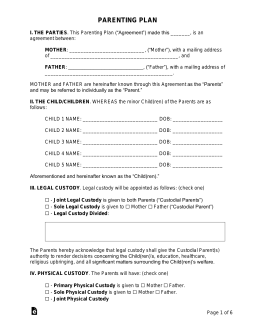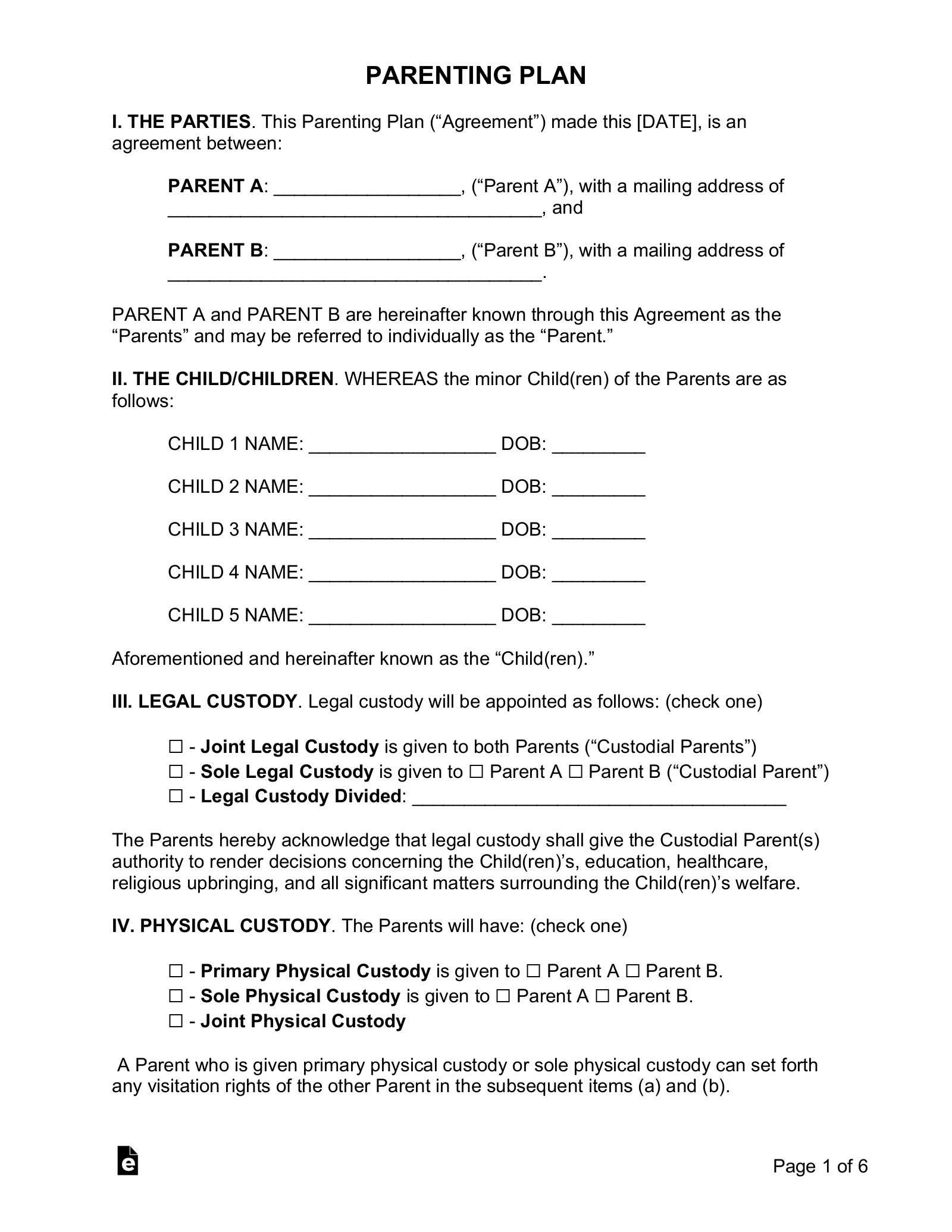Updated January 16, 2024
A custody agreement, or parenting plan, is a contract that outlines parenting rights, visitation, and support payments for children of parents that are no longer together. It can be used as part of a divorce or separation process and can also be used for unmarried parents seeking to establish a custody arrangement.
Judge’s Approval
The presiding judge must approve all custody arrangements made by the parents. The major contributing factor to a judge’s final decision is what is in the “best interest of the child.”
Factors in a Judge’s Decision (5)
A judge’s approval of a custody agreement is determined by:
- Ability to provide. A parent’s ability to provide a child’s needs, such as food, education, shelter, and health care;
- Stable home. To create an environment that is safe for the day-to-day living of a child;
- History of abuse. If a parent has a history of physical or emotional abuse;
- Child’s preference. The child’s preferred parent (depends on their age and maturity); and
- Parent’s condition. The physical and mental health of each parent.
By State
- Alabama
- Alaska
- Arizona
- Arkansas
- California
- Colorado
- Connecticut
- Delaware
- Florida
- Georgia
- Hawaii
- Idaho
- Illinois
- Indiana
- Iowa
- Kansas
- Kentucky
- Louisiana
- Maine
- Maryland
- Massachusetts
- Michigan
- Minnesota
- Mississippi
- Missouri
- Montana
- Nebraska
- Nevada
- New Hampshire
- New Jersey
- New Mexico
- New York
- North Carolina
- North Dakota
- Ohio
- Oklahoma
- Oregon
- Pennsylvania
- Rhode Island
- South Carolina
- South Dakota
- Tennessee
- Texas
- Utah
- Vermont
- Virginia
- Washington
- Washington D.C.
- West Virginia
- Wisconsin
- Wyoming
Table of Contents |
What is Custody?
Custody refers to the legal right to make decisions for a child and responsibility for their daily care. Both parents commonly agree to custody arrangements during the divorce or separation process.
Legal Custody
Legal custody is the authority for one to both parents to make decisions on behalf of a child (only). It DOES NOT refer to a child’s living arrangements.
Examples include:
- Education decisions. To dictate which school and teaching to receive.
- Medical treatments. Select procedures and vaccinations.
- Religious upbringing. To choose which faith, if any, the child is raised under.
- Employment. To dictate where and when a child can work.
- Extracurricular activities. To decide which organizations, clubs, sports, or groups the child can join.
- Traveling. Having the right to go with the child to another place outside of where a parent lives.
Physical Custody
Physical custody is the legal responsibility of a parent to provide day-to-day living arrangements for a child. This includes food, shelter, clothing, security, supervision, and emotional support.
In a physical custody arrangement, there are two types of parents:
- Custodial parent. Refers to a parent where the child resides. Both parents can be custodial parents under joint custody.
- Non-Custodial parent. Refers to a parent with only visitation rights whose child does not live with them.
Custody Arrangements (4 types)
1. Sole Custody
Legal: One parent has full rights to dictate and make all decisions for a child.
Physical: One parent has the full responsibility of living with and taking care of a child (custodial parent). The other parent has visitation rights only (non-custodial parent).
2. Joint Custody
Legal: Both parents have the right to dictate and make shared decisions for a child. Each parent has equal power in the child’s upbringing.
Physical: Both parents have the full responsibility of living with and taking care of a child (custodial parents).
3. Split Custody
When the parents split up the children, some live with one parent, while others with another parent. This is not a common arrangement unless the children have strong relationships with different parents.
A judge generally requires a strong preference of adolescent children to allow for split custody.
4. Bird’s Nest Custody
When the children live in a residence while the parents rotate on a schedule to reside in the home. This is a unique arrangement that is meant to help provide a secure environment instead of having the children constantly move due to the parents living in two locations.
What are Visitation Rights?
Visitation rights are given by a court to the other parent when one parent has sole custody. The court administers the type of visitation which generally occurs on weekends.
- Reasonable. Open-ended and flexible visitations are scheduled between the parents. This is common when both parents have good relations with one another.
- Scheduled. Approved by the court at a specific date and time every week, month, etc.
- Supervised. If the judge requires a 3rd party, commonly a social worker, to act as a chaperone during visits with a parent.
- Virtual. Common if a parent lives out-of-state, it allows a child to view their parent via an electronic device,
- No visitation. In the event of compromised safety for the child.
Child’s Preferred Parent (state laws)
Most states require a judge to include the child’s preference in their decision to divide custody or prescribe sole custody. Some states specify an age, while others do not.
| State | Child Preference Allowed? |
| Alabama | Yes, though a minimum age is unspecified |
| Alaska | Yes, if the child is of a “sufficient age” (§ 25.24.150(a)(3)) |
| Arizona | Yes, if the child is “of suitable age and maturity” (§ 25-403) |
| Arkansas | Yes, if the child is “of a sufficient age and mental capacity to reason, regardless of chronological age” (§ 9-13-101) |
| California | Yes, if the child is “of sufficient age and capacity to reason so as to form an intelligent preference” (Cal. Fam. Code § 3042) |
| Colorado | The court considers a child’s preferences related to parenting schedule if the child is “sufficiently mature” (§ 14-10-124) |
| Connecticut | Yes, “if the child is of sufficient age and capable of forming an intelligent preference” (Sec. 46b-57) |
| Delaware | Yes (§ 722 (2)) |
| Florida | No |
| Georgia | Children between ages 11 and 14 can share their custody preference with the court (§ 19-9-3(6)) and children 14 and older can file an Affidavit of Custody Election |
| Hawaii | A child of “sufficient age and capacity to reason” will be able to weigh in on the court’s decision (§ 571-46(a)(3)) |
| Idaho | Yes (§ 32-717(1)(b)) |
| Illinois | Yes, if the child is mature and able to express reasoned and independent preferences (750 ILCS 5/602.5) |
| Indiana | The court will consider the child’s wishes, with more consideration given if they are age 14 or older (§ 31-17-2-8) |
| Iowa | Yes (§ 598.41.3.f) |
| Kansas | Yes (§ 23-3203(3)) |
| Kentucky | The court may interview child to ascertain preference (§ 403.290(1)) |
| Louisiana | The court considers the “reasonable preference of the child, if the court deems the child to be of sufficient age to express a preference” (Art. 134(A)(11)) |
| Maine | The court considers the child’s preference if the child is “old enough to express a meaningful preference” (§ 1653(3)(C)) |
| Maryland | Yes, if the child is “old enough to make a rational choice” (Hild vs. Hild 1960) |
| Massachusetts | A judge may consider the child’s preference if they are of sufficient maturity and age (Youmans v. Ramos 1999) |
| Michigan | Yes, if the court considers the child to be of sufficient age to express a preference (§ 7 22.23(i)) |
| Minnesota | The court will consider the child’s preference if it “deems the child to be of sufficient ability, age, and maturity to express an independent, reliable preference” (§ 518.17) |
| Mississippi | The court may consider the preference of a child age 12 or older if both parents are determined to be fit for custody (§ 93-11-65) |
| Missouri | Yes (Mo. Rev. Stat. § 452.385) |
| Montana | Yes (§ 40-4-212(1)(b)) |
| Nebraska | Nebraska courts will consider the child’s preference if they are “of an age of comprehension” and when their wishes are “based on sound reasoning” (§ 43-2923(6)(b)) |
| Nevada | Yes, if “the child is of sufficient age and capacity to form an intelligent preference” (§ 125C.0035(4)(a)) |
| New Hampshire | Yes, is the child “of sufficient maturity to make a sound judgment,” and if the child’s preference was not “based on undesirable or improper influences” (§ 461-A:6-II) |
| New Jersey | Yes, “when of sufficient age and capacity to reason so as to form an intelligent decision” (N.J. Stat. § 9:2-4(c)) |
| New Mexico | Yes, if the child is age 14 or older (§ 40-4-9(1)) |
| New York | Yes, if the child is of “suitable age” (DOM § 240) |
| North Carolina | No (§ 50-13.01 – 50-13.7) |
| North Dakota | Yes, if the child is “of sufficient maturity to make a sound judgment” (14-09-06.2(1)(i)) |
| Ohio | Yes, if the child has “sufficient reasoning ability” (§ 3109.04(B)) |
| Oklahoma |
|
| Oregon | Rarely (Remillard and Remillard 1977) |
| Pennsylvania | Yes, if well-reasoned (§ 5328(a)(7)) |
| Rhode Island | Yes (Pettinato v. Pettinato 1990) |
| South Carolina | Yes, depending on the child’s age, experience, maturity, judgment, and ability to indicate a reasonable preference (§ 63-15-30) |
| South Dakota | Yes, “if the child is of a sufficient age to form an intelligent preference” (§ 25-4-45) |
| Tennessee | Yes, if the child is 12 years old or older (§ 36-6-106(13)) |
| Texas | The court may interview the child to determine their preference (§ 153.009) |
| Utah | Yes, especially if the child is 14 or older (§ 30-3-10(5)(ii)) |
| Vermont | No |
| Virginia | Yes, if the child is deemed to be “of reasonable intelligence, understanding, age, and experience to express such a preference” (§ 20-124.3) |
| Washington | Yes, if the child is “sufficiently mature to express reasoned and independent preferences as to his or her residential schedule” (RCW 26.09.187) |
| Washington D.C. | Yes (§ 16–914(3)(A)) |
| West Virginia | The court will consider the “firm and reasonable preferences” of a child who is either 14 years of age or older or “sufficiently matured” (§ 48-9-209) |
| Wisconsin | |
| Wyoming | Yes, if the child is “of sufficient age and maturity” (Love v. Love 1993) |
Uniform Child Custody Jurisdiction and Enforcement Act (UCCJEA)
The Uniform Child Custody Jurisdiction and Enforcement Act (UCCJEA) are laws implemented in 49 States (except Massachusetts) to discourage parents from “forum shopping” or selecting a state with favorable laws to file for custody.
“Home State”
The law establishes the same custody rules across different states. Specifically, in the event a parent moves away from a child’s “home state,” which is determined by:
- Six months. If the child lived in the same location for six consecutive months (or if the child is under six months and has lived there its entire life).
- Significant connections. When a child has a connection with a state that includes substantial evidence.
- Emergency. Resulting from abandonment, abuse, or other protective action.
- Vacuum. Applies when no other jurisdiction basis exists.
Indian Child Welfare Act
On June 15th, 2023, the Supreme Court upheld the ICWA (Indian Child Welfare Act), which applies to custody proceedings involving Native American children and establishes placement priority with extended family, other members of the child’s tribe, or other Native American families. Placement with non-Native families is considered as a last resort.
Breaking a Custody Agreement
A custody agreement could be broken due to:
- Change in circumstance. If a parent is to move a considerable distance away from the child.
- Failure to show. If a parent fails to show up for custody or visitation times.
- Breach. If a parent breaches any of the terms mentioned in the custody agreement.
- Endangerment. A change in safety conditions for the child by putting them in danger.
Parents unsatisfied with existing custody arrangements are not usually able to void a custody agreement and instead must submit a modified agreement to be approved by the court. Rules vary by state, but generally, new agreements must be created or ordered by a judge.
Sample
PARENTING PLAN
I. THE PARTIES. This Parenting Plan (“Agreement”) made this [DATE], is an agreement between:
MOTHER: [MOTHER’S NAME], (“Mother”), with a mailing address of [MOTHER’S ADDRESS], and
FATHER: [FATHER’S NAME], (“Father”), with a mailing address of [FATHER’S ADDRESS].
MOTHER and FATHER are hereinafter known through this Agreement as the “Parents” and may be referred to individually as the “Parent.”
II. THE CHILD/CHILDREN. WHEREAS the Child(ren) of the Parents are as follows:
CHILD 1 NAME: [CHILD 1 NAME] DOB: [BIRTH DATE]
CHILD 2 NAME: [CHILD 2 NAME] DOB: [BIRTH DATE]
CHILD 3 NAME: [CHILD 3 NAME] DOB: [BIRTH DATE]
Aforementioned and hereinafter known as the “Child(ren).”
III. LEGAL CUSTODY. Legal custody will be appointed as follows: (check one)
☐ – Joint Legal Custody is given to both Parents (“Custodial Parents”)
☐ – Sole Legal Custody is given to ☐ Mother ☐ Father (“Custodial Parent”)
☐ – Legal Custody Divided: [LIST DETAILS]
The Parents hereby acknowledge that legal custody shall give the Custodial Parent(s) authority to render decisions concerning the Child(ren)’s, education, healthcare, religious upbringing, and all significant matters surrounding the Child(ren)’s welfare.
IV. PHYSICAL CUSTODY. The Parents will have: (check one)
☐ – Primary Physical Custody is given to ☐ Mother ☐ Father.
☐ – Sole Physical Custody is given to ☐ Mother ☐ Father.
☐ – Joint Physical Custody
A Parent who is given primary physical custody or sole physical custody can set forth any visitation rights of the other Parent in the subsequent items (a) and (b).
a). General Schedule. The Child(ren)’s general parenting schedule will be as follows: [DETAILS]
b). Holiday Schedule. The Parents agree to divide holiday visitation as follows: [DETAILS]
V. TRANSPORTATION. The Parents hereby agree that transportation of the Child(ren) for the purposes of visitation, exchanges, and other activities shall be engaged in a manner that prioritizes the safety and well-being of the children. Transportation costs shall be divided as follows: (check one)
☐ – Equal Split
☐ – Covered by Mother
☐ – Covered by Father
☐ – Other: [LIST DETAILS]
VI. EXCHANGE POINT. The Parents agree that the address and location of the exchange point for the Child(ren) will be: [ADDRESS/LOCATION]
VII. TUITION EXPENSES. The Parents agree that additional tuition expenses, such as tuition fees, registration fees, and textbooks, shall be shared in the following manner by the parents: (check one)
☐ – Equally Split
☐ – Covered by Mother
☐ – Covered by Father
☐ – Other: [LIST DETAILS]
VIII. HEATH INSURANCE. The Child(ren)’s medical insurance, whether through an employee-sponsored health program or paid privately, will be: (check one)
☐ – Equally Split
☐ – Covered by Mother
☐ – Covered by Father
☐ – Other: [LIST DETAILS]
IX. NON-COVERED MEDICAL EXPENSES. The Parents agree that non-covered medical expenses shall be paid in the following manner by the Parents: (check one)
☐ – Equally Split
☐ – Covered by Mother
☐ – Covered by Father
☐ – Other: [LIST DETAILS]
X. TAX EXEMPTIONS. The following Child(ren) can be used as dependents for tax-related benefits: (check all that apply and write the Child(ren)’s names)
☐ – Mother shall have: [CHILD(REN)’S NAME(S)].
☐ – Father shall have: [CHILD(REN)’S NAME(S)].
☐ – The Parents shall alternate years.
XI. CHILD SUPPORT. Under this Agreement, there shall be: (check one)
☐ – NO CHILD SUPPORT. Neither Spouse is obligated to pay child support. Each Spouse shall provide direct support for the Child(ren) for those periods when the Child(ren) are in their physical custody.
☐ – CHILD SUPPORT PAYMENTS. Child Support payments shall be made by ☐ Mother ☐ Father to ☐ Mother ☐ Father in the following manner:
Payments of $[#] shall be due on the [DAY] of each month commencing on [DATE] (“Child Support”).
XII. TRAVEL (OUT OF AREA). All out-of-area travel must be approved by the Custodial Parent or mutually by both Custodial Parents, whichever is applicable. “Out of area travel” for the purposes of this Agreement shall mean a distance of [#] miles away from either of the Parents’ residences.
XIII. RELOCATION. The Parents agree to the following: (check one)
☐ – ALLOWED to Move. Either Spouse may move their residence by providing at least [#] days’ notice.
☐ – NOT ALLOWED to Move. Neither Spouse shall be allowed to move their residence more than [#] miles away from another without the other Spouse’s prior written consent or without an approved court order in the event the non-relocating Parent does not offer their consent.
XIV. SCHOOLING. The Parents agree to work together to ensure that the Child(ren) receives a quality education and shall cooperate in making decisions regarding the Child(ren)’s education.
XV. MILITARY SERVICE. Parents called to military service shall provide the other parent notice of deployment or assignment, and the parties shall work together to create a new parenting plan that considers the military service obligations.
XVI. COMMUNICATION. Both Parents and the Child(ren) shall have the right to communicate by telephone, in writing, or electronically during reasonable hours without interference by the other parent.
XVII. DISPUTE RESOLUTION. If the parents are unable to reach an agreement on an important issue about the Child(ren), disputes may be handled by a neutral third-party mediator.
XVIII. SEVERABILITY. If any term, covenant, condition, or provision of this Agreement is held by a court of competent jurisdiction to be invalid, void, or unenforceable, the remainder of the provisions shall remain in full force and effect and shall in no way be affected, impaired, or invalidated.
XIX. GOVERNING LAW. This document shall be governed by the laws of the State of [STATE].
XX. ADDITIONAL TERMS & CONDITIONS.
XXI. ENTIRE AGREEMENT. This Agreement contains the entire agreement of the Couple on these matters, superseding any previous agreement between them.
XXII. SIGNATURES AND DATES. The foregoing is agreed to by:
Mother’s Signature: _______________________________ Date: ______________
Print Name: _______________________________
Father’s Signature: _______________________________ Date: ______________
Print Name: _______________________________
Related Forms
 Marital Settlement Agreement – For a married couple seeking divorce and establishing the division of assets, alimony, and child custody.
Marital Settlement Agreement – For a married couple seeking divorce and establishing the division of assets, alimony, and child custody.
 Separation Agreement – For a couple seeking to remain married and live in separate residences while establishing the division of assets, alimony, and child custody.
Separation Agreement – For a couple seeking to remain married and live in separate residences while establishing the division of assets, alimony, and child custody.


